Top Rankings
Clinton City Schools School District ranks among the top 20% of public school district in North Carolina for:
Category
Attribute
Diversity
Most diverse schools (Top 1%)
For the 2025 school year, there is 1 public middle school serving 690 students in Clinton City Schools School District. This district's average middle testing ranking is 6/10, which is in the top 50% of public middle schools in North Carolina.
Public Middle School in Clinton City School School District have an average math proficiency score of 52% (versus the North Carolina public middle school average of 48%), and reading proficiency score of 50% (versus the 50% statewide average).
Minority enrollment is 84% of the student body (majority Hispanic), which is more than the North Carolina public middle school average of 56% (majority Black and Hispanic).
Overview
This School District
This State (NC)
# Schools
5 Schools
882 Schools
# Students
3,005 Students
494,023 Students
# Teachers
207 Teachers
31,644 Teachers
Student : Teacher Ratio
15:1
15:1
District Rank
Clinton City Schools School District, which is ranked within the bottom 50% of all 320 school districts in North Carolina (based off of combined math and reading proficiency testing data) for the 2021-2022 school year.
The school district's graduation rate of 78% has decreased from 87% over five school years.
Overall District Rank
#171 out of 325 school districts
(Bottom 50%)
(Bottom 50%)
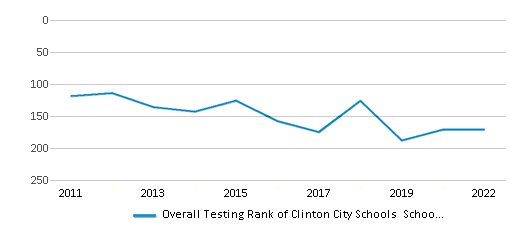
Math Test Scores (% Proficient)
53%
51%
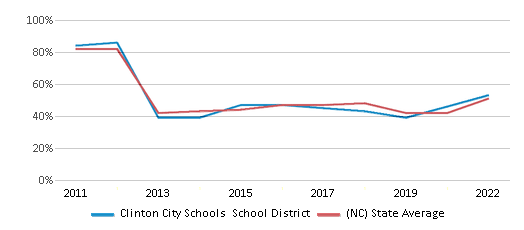
Reading/Language Arts Test Scores (% Proficient)
45%
50%
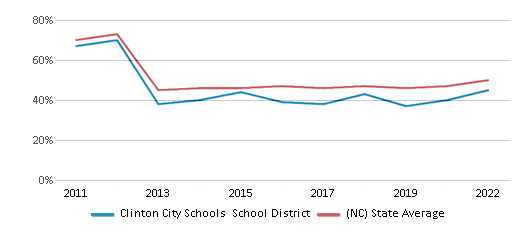
Science Test Scores (% Proficient)
60%
63%
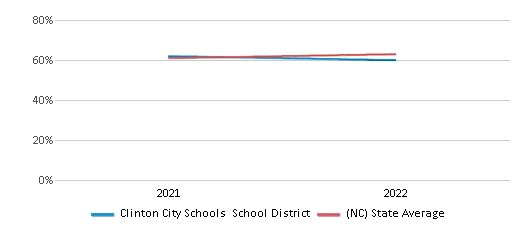
Graduation Rate
78%
86%
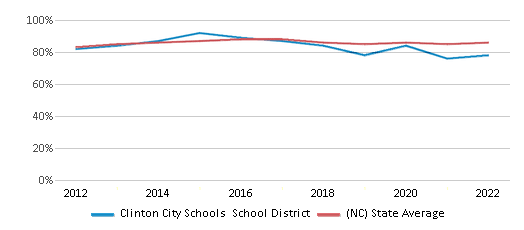
Students by Ethnicity:
Diversity Score
0.69
0.71
# American Indian Students
59 Students
5,633 Students
% American Indian Students
2%
1%
# Asian Students
16 Students
19,933 Students
% Asian Students
1%
4%
# Hispanic Students
1,237 Students
98,873 Students
% Hispanic Students
41%
20%
# Black Students
995 Students
122,407 Students
% Black Students
33%
25%
# White Students
544 Students
215,701 Students
% White Students
18%
44%
# Hawaiian Students
1 Student
646 Students
% Hawaiian Students
n/a
n/a
# Two or more races Students
153 Students
30,848 Students
% of Two or more races Students
5%
6%
Students by Grade:
# Students in PK Grade:
130
1,882
# Students in K Grade:
221
16,660
# Students in 1st Grade:
256
16,806
# Students in 2nd Grade:
216
17,050
# Students in 3rd Grade:
213
16,530
# Students in 4th Grade:
221
16,849
# Students in 5th Grade:
225
19,618
# Students in 6th Grade:
269
111,560
# Students in 7th Grade:
203
116,793
# Students in 8th Grade:
218
119,029
# Students in 9th Grade:
246
12,380
# Students in 10th Grade:
218
10,877
# Students in 11th Grade:
202
9,420
# Students in 12th Grade:
167
8,569
# Ungraded Students:
-
-
District Revenue and Spending
The revenue/student of $11,167 in this school district is less than the state median of $11,187. The school district revenue/student has stayed relatively flat over four school years.
The school district's spending/student of $10,600 is less than the state median of $11,612. The school district spending/student has stayed relatively flat over four school years.
Total Revenue
$34 MM
$17,307 MM
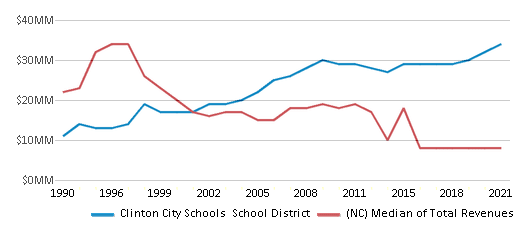
Spending
$32 MM
$17,964 MM
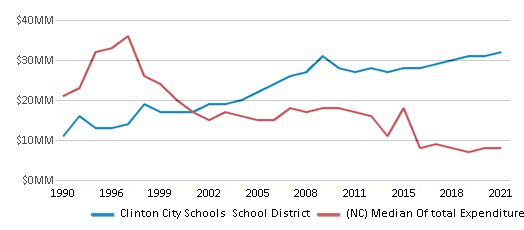
Revenue / Student
$11,167
$11,187
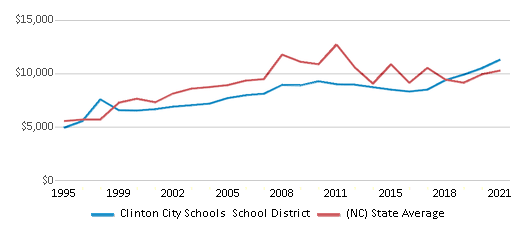
Spending / Student
$10,600
$11,612
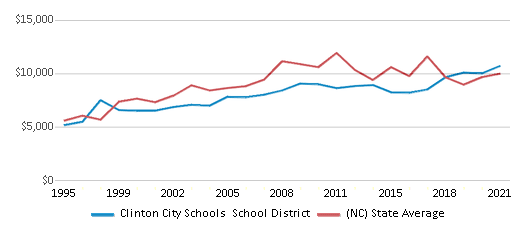
Best Clinton City Schools School District Public Middle Schools (2025)
School
(Math and Reading Proficiency)
(Math and Reading Proficiency)
Location
Grades
Students
Rank: #11.
Sampson Middle School
(Math: 52% | Reading: 50%)
Rank:
Rank:
6/
Top 50%10
1201 W Elizabeth St
Clinton, NC 28328
(910) 592-3327
Clinton, NC 28328
(910) 592-3327
Grades: 6-8
| 690 students
Recent Articles

Year-Round Or Traditional Schedule?
Which is more appropriate for your child? A year-round attendance schedule or traditional schedule? We look at the pros and cons.

Why You Should Encourage Your Child to Join a Sports Team
Participating in team sports has a great many benefits for children, there is no doubt. In this article you will learn what those benefits are.

White Students are Now the Minority in U.S. Public Schools
Increasing birth rates among immigrant families from Asia and Central and South America, combined with lower birth rates among white families, means that for the first time in history, public school students in the United States are majority-minority. This shift in demographics poses difficulties for schools as they work to accommodate children of varying language abilities and socio-economic backgrounds.





